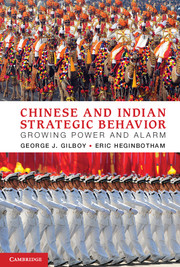Book contents
- Frontmatter
- Contents
- Figures
- Tables
- Acknowledgments
- Preface
- Abbreviations
- Map
- 1 Introduction
- 2 Strategic Culture
- 3 Foreign Policy, Use of Force, and Border Settlements
- 4 Military Modernization
- 5 Military Doctrine
- 6 Military Force Modernization and Power Projection
- 7 Economic Strategic Behavior
- 8 India, China, and Democratic Peace Theory
- 9 Meeting the Dual Challenge
- Appendix Defense Spending, Selected Additional Data
- Bibliography
- Index
- References
3 - Foreign Policy, Use of Force, and Border Settlements
Published online by Cambridge University Press: 05 June 2012
- Frontmatter
- Contents
- Figures
- Tables
- Acknowledgments
- Preface
- Abbreviations
- Map
- 1 Introduction
- 2 Strategic Culture
- 3 Foreign Policy, Use of Force, and Border Settlements
- 4 Military Modernization
- 5 Military Doctrine
- 6 Military Force Modernization and Power Projection
- 7 Economic Strategic Behavior
- 8 India, China, and Democratic Peace Theory
- 9 Meeting the Dual Challenge
- Appendix Defense Spending, Selected Additional Data
- Bibliography
- Index
- References
Summary
Some assessments of Chinese foreign policy argue that China’s strategic culture inculcates aggression, leading China toward assertive foreign policies, including the use of force. As the preceding chapter indicates, however, when compared to core texts that may shape Indian strategic thought, the Chinese classics on strategic thinking appear less unique. In this chapter, we examine the two countries’ foreign policy trajectories, their use of force, and their record of border conflict and settlements. This will provide further comparative context for making judgments about Chinese and Indian international strategic behavior.
In many influential studies of Chinese foreign policy, judgments have already been made. Some scholars believe the People’s Republic of China (PRC), like its imperial predecessor, uses force “frequently,” with the implication that this means China uses force more frequently than other states. In this view, using force is a primary – perhaps preferred – Chinese method for conducting international politics. Another view argues that Chinese security policy is characterized by a “cult of defense,” which causes Chinese leaders to rationalize the use of offensive force as being purely defensive and increases the chances that China will be involved in future war.
- Type
- Chapter
- Information
- Chinese and Indian Strategic BehaviorGrowing Power and Alarm, pp. 40 - 93Publisher: Cambridge University PressPrint publication year: 2012



